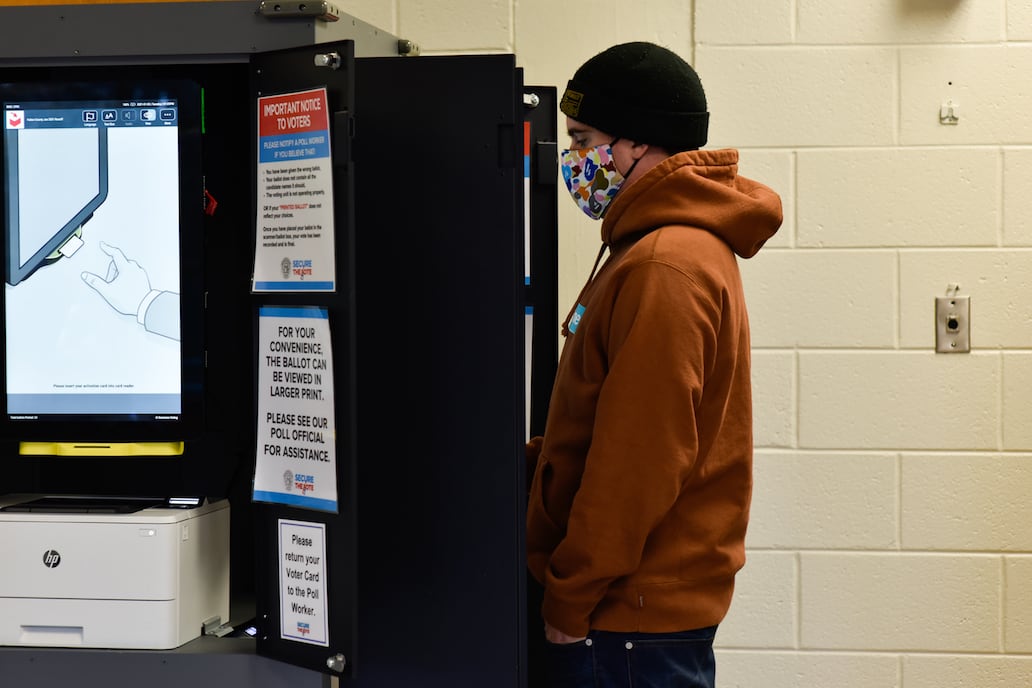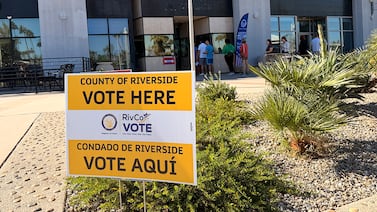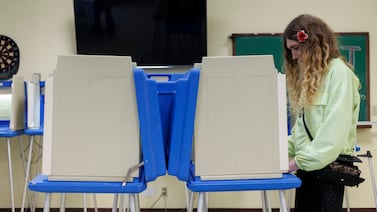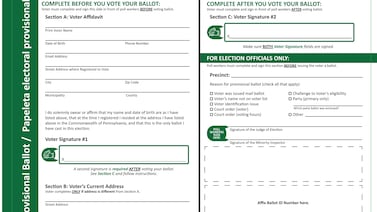A version of this post was originally distributed on Jan. 29 in Votebeat’s weekly newsletter. Sign up here.
Conspiracy theories collided in Georgia in late January, resulting in additional confusion in a long-standing lawsuit over the state’s use of Dominion voting machines. At the center of efforts by entities on both the left and right is a court-sealed report by University of Michigan computer scientist J. Alex Halderman claiming that the Dominion voting system has a vulnerability that could be exploited — but hasn’t yet — to manipulate votes in a future election.
Fox News and One America News Network are now seeking a copy of the report, and this week the Atlanta Journal-Constitution suggested Georgia’s secretary of state had ignored the report, leaving gaping holes in the state’s election system. There’s much, much more to the story. The upshot is that this lawsuit continues to be used today by those perpetuating Trump’s Big Lie as evidence of their claims.
The lawsuit was initially filed in 2017 by the left-leaning Coalition for Good Governance and a group of individual voters, to force Georgia to use paper-backed voting machines. At the time, Georgia was using outdated DRE machines. Then the state, amid the litigation and after the legislature authorized and funded new machines in early 2019, replaced the DREs in 2020 with a paper-backed voting system built by Dominion. But the lawsuit, now known as Curling v. Raffensperger, didn’t stop. It instead shifted to alleging that the new system was so insecure as to be unconstitutional.
Over four years of litigation, the plaintiffs have not succeeded in their goal of moving Georgia’s elections almost exclusively to hand-marked paper ballots. While U.S. District Judge Amy Totenberg has expressed public concern over the Dominion system, she has not been persuaded to make the state abandon it. So far, Totenberg has not forced the state to make any major changes to its voting system that it wasn’t already prepared to make, even as her August 2019 order required the secretary of state to replace the DREs by the state’s 2020 deadline.
Experts who have reviewed Halderman’s report, such as Juan Gilbert, the University of Florida’s computer science department chair, have not found it to be nearly as dire as Halderman has publicly suggested. As part of the suit, Judge Totenberg granted Halderman unfettered access to the Dominion voting system in order to inspect the security of the machines. Because of his access, Totenberg sealed the report, making it available to only the attorneys on the case and the expert witnesses. And even though the state on Jan. 27 asked Totenberg to unseal the document so as to clear public confusion, she seemed unready to do so.
“I’m unhappy about the course of political treatment of the report…. it’s out of hand,” Totenberg said in court. “But I’m not going to release it without seeing what is being proposed with redactions.”
Still, the general contents of the report aren’t exactly a secret. Halderman has long claimed that ballot-marking devices could be manipulated by malicious actors. Halderman made public a high-level summary of his findings in early August. Marilyn Marks, the executive director of the Coalition for Good Governance who is among the plaintiffs in the Curling case, then distributed this summary to every county in Georgia by email the day after Halderman filed his report. Votebeat was provided with a copy of the email. She called Halderman’s finding an “urgent concern,” alarming enough for counties “to reconsider their use of BMDs this fall, and instead use hand marked paper ballots with voluntary robust audits.” No county acted on her warning.
Despite Judge Totenberg sealing Halderman’s assessment, the publicity campaign some of the plaintiffs have mounted over the report — which none of them has seen in full — has resulted in two media dustups over its contents, to the obvious discontent of Totenberg. The first was in August, when Halderman first publicized what he claimed were massive security flaws in the system, and then in late January, when the Atlanta Journal-Constitution reported that the state had done nothing to unseal the report or to act on its findings. This is the exact kind of speculation Totenberg sought to prevent when she sealed the report. The AJC quoted multiple people without noting which of them did or didn’t have knowledge of the report’s full details but who nonetheless implored the state to act. That’s not the responsible way to present these issues.
The report, as far as is publicly known, does little to materially advance what Halderman has been claiming about ballot-marking devices for years, because it’s not a surprise that he found ways to infiltrate the system. Judge Totenberg gave Halderman complete access to the machines along with passwords, and his report indicates that he did his research over 12 weeks. If you gave me access to a bank for 12 weeks, handed me the keys, and told the security guards to stand down, I’m pretty sure I could rob it. This is an unrealistic threat scenario that ignores the effectiveness of physical security measures, machine testing, and risk limiting audits that election officials and experts generally put their trust in.
“The security of the system isn’t dependent only on the system itself, but everything that surrounds it. The seals, the padlocks, the cameras,” said Tammy Patrick, a senior advisor at the Democracy Fund and former elections administrator in Maricopa County, Arizona. “If you leave the keys in an unlocked car and you’re surprised I can drive away in it, that’s not a measure of the car’s security.”
Dominion and the secretary of state offered similar responses when the debate resurfaced in January. In a statement, Dominion said the best way to review security is holistically — taking into account “procedural and technical safeguards,” but that Halderman’s review “did not take this approach.” The secretary of state’s office, in its statement, said the review was written “by an individual who is paid to espouse opinions supporting the elimination of electronic voting systems.”
That’s punchy — you might expect as much from a defendant in a lawsuit — but neither statement is necessarily untrue. Halderman is being paid. His assessment was done with more access to the system than any bad actor would have, and has been reviewed by two state experts, neither of whom was persuaded that the state’s system was at imminent risk of harm. Halderman himself has repeatedly and publicly acknowledged there is no evidence that the machines were manipulated to affect the election results in 2020.
Election security has made large strides since 2016, which reporters need to do a more fulsome job explaining. It is increasingly common for counties to conduct extensive post-election audits, which check for unexplainable discrepancies between the machines’ vote counts and counts of the actual ballots. Election offices across the country have shored up chain-of-custody procedures for ballots and election equipment, and have phased out paperless voting machines almost entirely. States have also long conducted specific logic and accuracy testing for voting machines, and these tests are routinely performed. Patrick says that focusing on unrealistic cybersecurity threats is “disingenuous” and “diverts the energy that we need to put forth in getting productive policies in place, and further muddies the public’s understanding of what good security looks like.”
Allowing such unfettered access isn’t without value: If Halderman had, for example, been able to affect the ballots in a way that could not be detected and prevented by safeguards like risk limiting audits or standard quality checks, these problems should be addressed. But neither the AJC article nor those who have seen the report have independently confirmed that he found such vulnerabilities.
Still, folks are clamoring to get access to Halderman’s sealed report. The state of Louisiana, Fox News, and One America News Network have all asked Judge Totenberg to see it. Louisiana — which has already been denied access — says it wants a copy because it’s considering buying a Dominion system and would like to see what the vulnerabilities are. Fox and OANN want it because they think it might contradict Halderman’s testimony in defamation lawsuits filed by Dominion and by Eric Coomer, a former Dominion employee. In that case, Halderman testified in defense of Coomer and his work at Dominion — Coomer’s work was high quality, Halderman says, and there is no evidence that Dominion machines were compromised.
Despite what Fox News’s lawyers might hope, Halderman’s positions in each lawsuit are not necessarily contradictory. It could well be true that the 2020 election was secure — as he asserts in the Fox defamation suit — and that untapped vulnerabilities still exist in Dominion systems — as he asserts in the Curling suit.
But this is not the only time right-wing spreaders of the Big Lie have embraced the Curling lawsuit to back their false claims. In January, Politico reported on the text of a never-seen Trump executive order that would have dispatched the military to seize voting machines. The order, dated Dec. 16, 2020, specifically references the Curling lawsuit in justifying the federal government to “seize, collect, retain and analyze all machines, equipment, electronically stored information, and material records” from the election. The order would have given the defense secretary 60 days to release a report on the machines’ security — a move that would have thrown the election into uncertainty well into February 2021.
Unlike Trump’s allies, we should resist falling into the logical trap of assuming that potential vulnerabilities in the machines mean they have already been exploited. We should also be clear-eyed about the link between this lawsuit and the raging fire of the Big Lie. David Becker, executive director and founder of the Center for Election Innovation & Research, which helped Georgia research new voting systems, says it is “simply a fact that then-President Trump used these failed claims to justify his failed coup” and his unsigned executive order.
“Whatever their intentions, it’s undeniable that those who have brought recent claims in courts attempting to decertify particular voting machines they didn’t like — all of which have failed — have found their claims and testimony used by election deniers who seek to undermine voter confidence and the legitimacy of the 2020 election and future elections,” Becker said.
Journalists covering the Curling suit and Halderman report should always — every single time the case is mentioned — make explicit that the suit’s arguments have been turned into a primary piece of evidence for Big Lie adherents claiming the 2020 election was stolen through manipulated Dominion machines. These details should not be drowned out by alarmist quotes, alleging vulnerabilities that no one else has confirmed. And they should also explain that Halderman’s report was based on unfettered access to the system, which is not analogous to a real-world environment on Election Day.
It might be uncomfortable for many that accusations against Dominion — none of which have, so far, flown in court — by plaintiffs that include a left-leaning activist group were a basis for Trump’s claims to continued power. But it is true. And now Fox and OANN are seeking the same sensitive information to potentially twist to their own advantage. This is a complicated mess, but it’s important that journalists untangle this context in every story they write on the subject. Including anything less than this distorts the reality of the problem, and risks introducing unfounded doubts among voters about the security of their voting system.
Back Then
Since direct-recording electronic machines became popular as a response to the disputed 2000 presidential election, there have been folks advocating for paper instead. In 2003, Rep. Rush Holt (D-New Jersey) introduced a bill that would have required a paper trail in all federal elections. It went nowhere, and he introduced it again in 2007, when it, again, went nowhere. It received substantial opposition from others in Congress as well as state election officials. It was rejected by most Republican members of Congress as overtly partisan — sour grapes resulting from George W. Bush’s victory. State election officials worried about the tight timeline, unfunded financial demands, and federal overreach. More than a decade later, most states have made this transition on their own.
In Other Voting News
- President Trump is redoubling his push for dropbox bans across the country, and a number of Republicans are hopping on the train. That train is currently stuck in Wisconsin, where election officials are at a deadlock on how to handle Republican demands that the rules for dropboxes be formalized or withdrawn entirely.
- Attorneys for Election Systems & Software have informed the Republican-led election investigation in Wisconsin that they have no intention of complying with a broad subpoena for the company’s data and information. In a letter to former Wisconsin Supreme Court Justice Michael Gableman, who is running the investigation, ES&S attorneys called the subpoena a “quintessential fishing expedition.”
- Following false coverage of the Electronic Registration Information Center — a nonprofit several dozen states use to help maintain their voter rolls — by Gateway Pundit, the state of Louisiana has ended its use of the program. Gateway Pundit unleashed a fusillade of false charges against ERIC, including accusations that the program is a leftist plot funded by George Soros. In truth, it is used and overseen by more than 30 member states, including Republican-governed states such as Kentucky, Missouri, Ohio, Alabama, Georgia, and Florida.
- Gjergi Luke Juncaj of Las Vegas, was criminally charged for making threats against an election administrator in Nevada. The man allegedly made repeated threatening calls, including telling the administrator she was “going to f—ing die” for stealing the election from Trump.
- After wavering due to cost projections, the Indiana Legislature has re-added a 2024 deadline for counties to institute paper backups to their voting machines. While the deadline is back, there continues to be no funding for the measure, and counties will be required to foot the cost on their own.
- The overwhelmingly Democratic Massachusetts House has approved a measure that would make vote by mail and early balloting permanent in the state. The state Senate approved a similar bill several weeks ago, which will now be reconciled with the House bill. The status of same-day registration, which advocates have been loudly asking for in the state, is less certain.
- Counties in Texas continue to report high rejection rates of absentee ballot applications due to the new law’s ID requirement. Meanwhile, Travis County Clerk Dana DeBeavoir has retired after 36 years on the job. She’s overseen a tremendous amount of change since she took the helm in the mid-80s, and even in retirement she’s not leaving elections. “What really kind of tipped me over the edge is I’d really like to do international elections work and do some work nationally on elections, on audits and elections ethics,” she told KUT.
- Attention South Carolina teens: Effective now, if you are currently 17 but will be 18 before Election Day, you can go ahead and register to vote!
- A bill by Nebraska Sen. Mike Groene (R-North Platte) would have dramatically shortened early voting in the state but fell flat on its face. Not a single member of the committee voted for it, and no one testified in favor.







